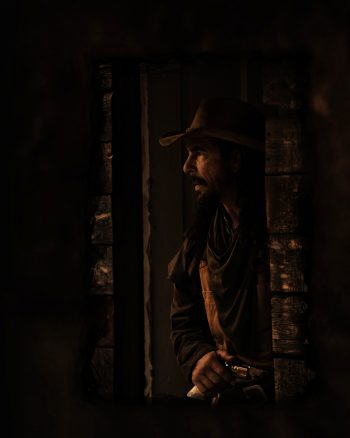As a child, Billy Dzwonkowski would take pictures of trains, but the Bradenton, Fla., artist didn’t realize then that he would one day be a preeminent photographer. “I liked taking pictures, but I had no idea I wanted to make a living doing that. I wasn’t on the yearbook staff in high school and when I went on a trip to London, I didn’t even take a camera,” Dzwonkowski says.
Later in high school, fate stepped in and subtly guided Dzwonkowski to a world behind the lens. He was in marching band with photographer Al Gordon’s son. He was the unofficial marching band photographer and would often suggest that Dzwonkowski come by the studio so he could teach him the art of taking pictures. It wasn’t until two years later – on his 20th birthday – that he took Gordon up on his offer, and he hasn’t looked back since. “I’ve been doing this for 10 years now, and it never gets old,” he said.
When discussing his Sunset Award-winning print “Vigilante,” Dzwonkowski says it was a case of right place, right time. “I was teaching a class with another local photographer and when it came time for the students to practice what they’d learned, the models donned western wear for a Wild West shoot,” he says.
Noticing a lone model standing in a doorway, waiting for the students to start, he knew he couldn’t pass up the opportunity to capture the moment. “After I took the shot, I envisioned the final image having an aged feel to it – faded colors, torn edges,” Dzwonkowski says. “With so much character in his face and his clothes, aging it would give such authenticity to the image.”
For Dzwonkowski, it’s important that his photographs aren’t just pretty pictures; he wants the images to tell a story. In fact, he believes that “photographer” is the wrong word for what he does. “I believe I’m actually a story teller,” he says. “I don’t want someone to just think ‘what a nice picture,’ I want the photograph to tell a story, I want observers to feel something.”
One of the best ways to gauge his storytelling ability is by submitting his work for judging at competitions. Attending seminars and listening to other people give tips and tricks is a great way to learn the basics, but to get direct feedback and suggestions for your own work is where the real education happens.
“When judges suggest alternate ways to improve an image, I always take that feedback to heart,” he says. “You need to have a thick skin sometimes, though. I know they aren’t judging me as a person, they are trying to help me improve as a photographer. I’ve found that judging panels are not the same, and I learn something from every experience.”
If he’s offering tips and tricks to others or getting feedback from a judging panel, the passion for doing shows is innate for Dzwonkowski. A naturally competitive person, getting ready for a show is the equivalent to a football player getting ready to hit the gridiron on any given Sunday. “The best way to improve is to compete,” he says. “It’s such an adrenaline rush for me.”


